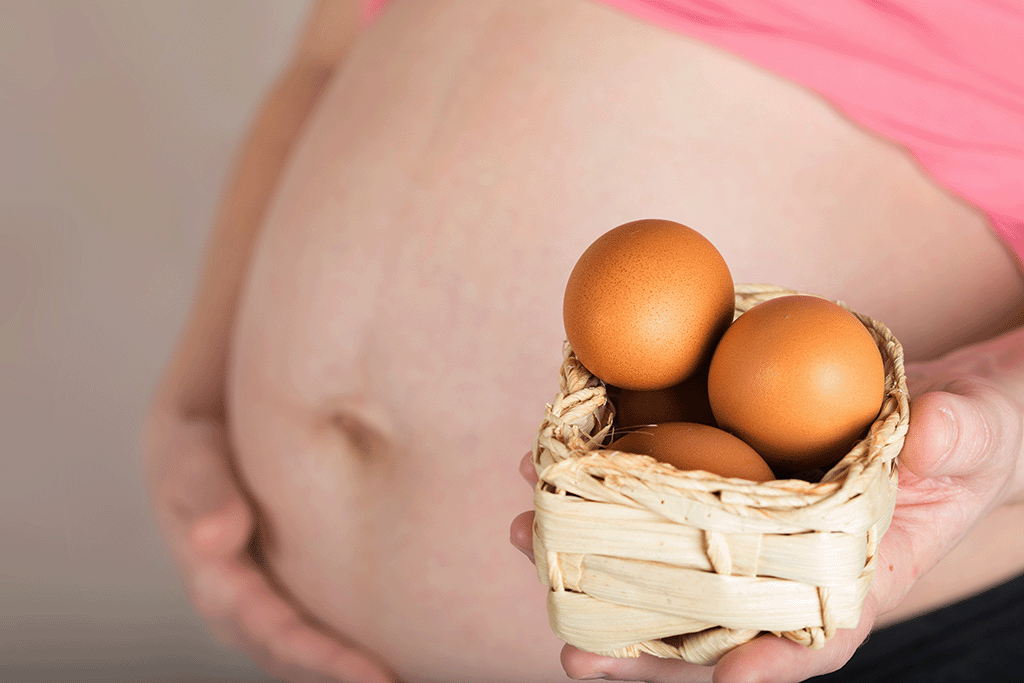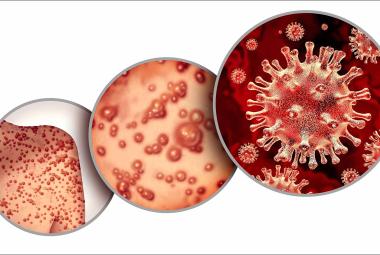Introduction
Pregnancy and lactation require intense maternal bodily adaptions and changes in nutritional needs to support the growth and development of the fetus. Certain nutrients are particularly important while pregnant or breastfeeding.1
Choline has recently become a “hot topic” for nutrition during pregnancy. Large amounts of choline-derived molecules are needed during pregnancy to support fetal development, rapid cell division, growth, and nerve myelination (myelin is the protective coating that surrounds nerves and helps them transmit information quickly!). Unfortunately, data suggest that most pregnant women in the U.S. consume less choline than is recommended.2
What is choline?
Choline is a component of several larger molecules that are important in the development of the fetal nervous system, including the brain. Choline is an essential nutrient that is critical for gene expression, neurotransmission, making membranes, and tissue expansion.3 Choline is vital to metabolism, cell structure and integrity, memory, muscle control, transportation of fats, and ensuring a healthy nervous system!
Researchers examined 54 studies that looked at the relationship between maternal choline intake, neurological development, and brain function during the first 1000 days of life. Investigators found that choline supplementation during pregnancy was associated with faster information processing in infants and improvement in memory related tasks.4 These authors further suggested that maternal supplementation with choline, particularly phosphatidyl-choline, supported normal brain development, and that higher doses may protect against neural and metabolic abnormalities.
What is the recommended choline intake?
According to the Institute of Medicine (now known as the National Academy of Medicine), pregnant women should consume 450 mg/day of choline from either food and/or supplemental sources.5 National (U.S.) survey data indicate that the average choline intake among pregnant individuals was about 319 mg/day, and only 8.5% of pregnant women consumed choline at or above the recommended amount.2 Furthermore, individuals who avoided eggs and animal proteins had even lower choline intakes. Table 1 shows the daily choline requirements by age, gender, and pregnancy/breastfeeding status.6
Table 1. Adequate intakes for choline.
| Age |
Male |
Female |
Pregnancy |
Lactation |
|
Birth to 6 months |
125 mg/day |
125 mg/day |
|
|
|
7-12 months |
150 mg/day |
150 mg/day |
|
|
|
1-3 years |
200 mg/day |
200 mg/day |
|
|
|
4-8 years |
250 mg/day |
250 mg/day |
|
|
|
9-13 years |
375 mg/day |
375 mg/day |
|
|
|
14-18 years |
550 mg/day |
400 mg/day |
450 mg/day |
550 mg/day |
|
19+ years |
550 mg/day |
425 mg/day |
450 mg/day |
550 mg/day |
Institute of Medicine. Food and Nutrition Board. Dietary Reference Intakes: Thiamin, Riboflavin, Niacin, Vitamin B6, Folate, Vitamin B12, Pantothenic Acid, Biotin, and Choline. Washington, DC: National Academy Press; 1998
How do I increase my choline intake?
National data suggest that most pregnant women consume inadequate choline, and thus may benefit from increasing choline intake. Unfortunately, most prenatal supplements contain little choline, typically between 0 and 50 mg, significantly less than the 450 mg that is recommended. Many of the common prenatal vitamins contain no choline at all. To make up for this difference, pregnant women are encouraged to consume foods rich with choline (Table 2). Examples of such foods include eggs, meat, poultry, seafood, and dairy. 2,5 While beef, eggs, chicken, fish, and pork have the highest concentrations of choline, providing more than 60 mg per 100 g of product, cow’s milk is the primary contributor to dietary choline intake in the United States.3
Choline itself comes in various forms. The most prominent dietary form of choline is phosphatidylcholine, but other forms include free choline, phosphocholine, and sphingomyelin.7 Table 3 shows different forms of choline and their functions.8 An individual’s “total” choline is comprised of all the various forms and can be converted to other forms.3
Choline supplements also contain different forms of choline. One study in non-pregnant, non-lactating people suggested that choline consumed from a choline bitartrate supplement (a synthetic form of choline) increased body concentrations of a compound called TMAO (trimethylamine N-oxide), which has been linked to increased heart disease risk.9 However, consuming an equivalent amount of choline from either phosphatidylcholine supplements or increased egg intake, showed no significant increase in TMAO. These findings alone indicate that the form of choline ingested may affect the health benefits of choline supplementation.9 More studies are needed that examine the potential effects of different forms of choline and their impact on fetal development.
Table 2. Choline content of various foods.
|
Food |
Milligrams(mg) per serving |
|
Beef liver, 3oz |
356 |
|
Egg (large) |
147 |
|
Soybeans, ½ cup |
107 |
|
Chicken breast, 3oz |
72 |
|
Fish (Atlantic Cod), 3oz |
71 |
|
Red Potato (large) |
57 |
|
Kidney beans, ½ cup |
45 |
|
Quinoa, 1 cup |
43 |
|
Milk, 1%, 1 cup |
43 |
|
Yogurt, 1 cup |
38 |
|
Brussel Sprouts, ½ cup |
32 |
|
Broccoli, ½ cup |
31 |
|
Cottage Cheese, 1 cup |
26 |
|
Peas, ½ cup |
24 |
|
Brown rice, 1 cup |
19 |
|
Carrots, ½ cup |
6 |
|
Apples, ½ cup |
2 |
Adapted from: NIH Office of Dietary Supplements. Choline: Fact sheet for health professionals. https://ods.od.nih.gov/factsheets/Choline-HealthProfessional/.
Choline during Pregnancy
High estrogen levels and increased metabolism during pregnancy increase the body’s demand for choline.10 The body converts choline into different forms to be utilized for different processes (Table 3). How choline gets partitioned into these forms differs between pregnant and non-pregnant individuals, even when ingesting the same amount of choline.10 In one study, choline was provided as supplements to pregnant women – some received the recommended amount (450 mg/d) and others received double the recommended amount (900 mg/d). The pregnant women who ingested double the daily recommendation restored the difference in partitioning between the various pathways to that of the nonpregnant state. The higher level of choline intake beneficially influenced several pregnancy outcomes including improvements of neonatal stress reactivity, faster information processing speed among infants, and better memory in children.3
Table 3. Choline-containing compounds and their functions.
|
Types of Choline |
Function |
|
Phosphatidylcholine |
Cell membranes, cell signaling, fat transport and metabolism |
|
Sphingomyelin |
Cell membranes, nerve myelination, & cell signaling |
|
Sphingophosphocholine |
Cell signaling |
|
Acetylcholine |
Muscle control, circadian rhythm, memory |
|
Platelet Activating Factor |
Cell signaling |
Adapted from: Wallace T, et al. The Neurocognitive Essential Nutrient of Interest to Obstetricians and Gynecologists, Journal of Dietary Supplements, 17:6, 733-752, DOI: 10.1080/19390211.2019.1639875
Choline during Lactation
Women who are breastfeeding are recommended to consume 550 mg of choline daily throughout the first year postpartum, 100 mg more than what is recommended during pregnancy.6 A breastfeeding mother needs extra choline to meet the demands of her own body as well as that of her growing baby. Choline content of breast milk can influence infants’ circulating choline levels.11 One study even suggests that choline supplementation during pregnancy and lactation reduces inflammation in breastfeeding women postpartum.12
Takeaways
Choline is a critical nutrient during pregnancy and lactation for neurocognitive development before and after birth with lasting effects in children. Further studies are needed to understand whether these effects persist into adulthood. Most pregnant and breastfeeding women consume inadequate amounts of choline, and prenatal and postnatal multivitamins are typically insufficient in choline. Choline supplementation during pregnancy and lactation has shown some benefits; however, more research is needed to understand health impacts of common forms of choline supplements. Thus, adequate choline intake through consumption of choline-rich foods is encouraged for pregnant and lactating women.
Jessyca Turner Cripps, MPH, MS4
Christine D. Garner, PhD, RD, CLC
References
- Garner, C. (2022, April 14). Nutrition in pregnancy: Dietary requirements and supplements. UpToDate. Retrieved October 10, 2022, from https://us.uptodate.com/contents/nutrition-in-pregnancy-dietary-require…!
- Wallace, TC, Fulgoni, VL. Usual choline intakes are associated with egg and protein food consumption in the United States. Nutrients. 2017 Aug 5;9(8):839. doi: 10.3390/nu9080839. PMID: 28783055; PMCID: PMC5579632.
- Korsmo, H.W., Jiang, X., Caudill, M.A. Choline: Exploring the growing science on its benefits for moms and babies. Nutrients. 2019 Aug 7;11(8):1823. doi: 10.3390/nu11081823. PMID: 31394787; PMCID: PMC6722688.
- Derbyshire, E., Obeid, R. Choline, neurological development and brain function: A systematic review focusing on the first 1000 days. Nutrients. 2020 Jun 10;12(6):1731. doi: 10.3390/nu12061731. PMID: 32531929; PMCID: PMC7352907.
- NIH. Choline. Fact sheet for health professionals. https://ods.od.nih.gov/factsheets/Choline-HealthProfessional/ (Accessed on August 10, 2021).
- Institute of Medicine. Food and Nutrition Board. Dietary Reference Intakes: Thiamin, Riboflavin, Niacin, Vitamin B6, Folate, Vitamin B12, Pantothenic Acid, Biotin, and Choline. Washington, DC: National Academy Press; 1998.
- Patterson, Y, Bhagwat, A, Williams, R, Howe, C, Holden, M. USDA Database for The Choline Content of Common Foods; Release 2; Agricultural Research Service: Washington, DC, USA, 2008.
- Wallace, Taylor C, Blusztain, Jan Krzystof, Caudill, Marie A., Klatt, Kevin C., Zeisel, Steven H. Choline: The neurocognitive essential nutrient of interest to obstetricians and gynecologists, Journal of Dietary Supplements. 2020 17:6, 733-752, DOI: 10.1080/19390211.2019.1639875
- Wilcox J, Skye SM, Graham B, Zabell A, Li XS, Li L, Shelkay S, Fu X, Neale S, O’Laughlin C, Peterson K, Hazen SL, Tang WHW. Dietary choline supplements, but not eggs, raise fasting TMAO levels in participants with normal renal function: A randomized clinical trial. Am J Med. 2021 Sep;134(9):1160-1169.e3. doi: 10.1016/j.amjmed.2021.03.016. PMID: 33872583.
- Yan, J, Jiang, X, West, A.A, Perry, C.A, Malysheva, O.V, Brenna, J.T, Stabler, S.P, Allen, R.H., Gregory, J.F., 3rd; Caudill, M.A. Pregnancy alters choline dynamics: Results of a randomized trial using stable isotope methodology in pregnant and nonpregnant women. Am J Clin Nutr. 2013, 98, 1459–1467.
- Ilcol, Y.O., Ozbek, R., Hamurtekin, E., Ulus, I.H. Choline status in newborns, infants, children, breast-feeding women, breast-fed infants and human breast milk. J Nutr Biochem. 2005 Aug;16(8):489-99. doi: 10.1016/j.jnutbio.2005.01.011. PMID: 16043031.
- Ozarda, Y., Cansev, M., Ulus, I.H. Breast milk choline contents are associated with inflammatory status of breastfeeding women. J Hum Lact. 2014 May;30(2):161-6. doi: 10.1177/0890334413508004. PMID: 24194609.







